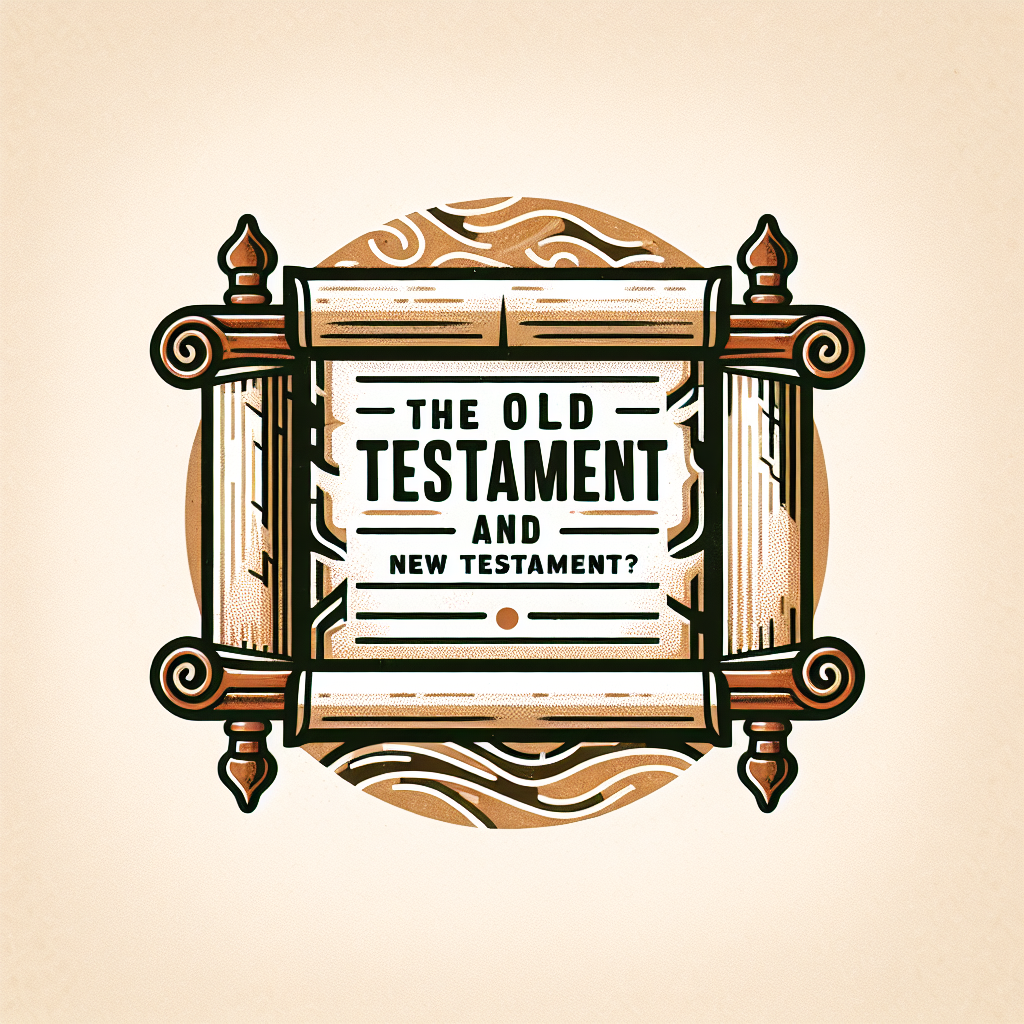Are you curious about the origins and significance of the Old Testament and New Testament? These two major divisions of the Christian Bible hold immense importance for believers around the world. The Old Testament, also known as the Hebrew Bible, serves as a collection of sacred scriptures that predate the birth of Jesus Christ, revealing the rich history, prophecies, and laws of ancient Israel. On the other hand, the New Testament focuses on the life, teachings, death, and resurrection of Jesus, introducing a new covenant and presenting an in-depth exploration of Christian beliefs and values. Join us as we explore the essence and purpose of these powerful texts, uncovering the treasures they hold within.
Understanding the Old Testament
Definition
The Old Testament, also known as the Hebrew Bible, is a sacred text that holds great significance for both Judaism and Christianity. It is a collection of religious writings, historical accounts, laws, prophetic messages, and songs that were written over a span of centuries. The Old Testament is an important part of the Christian Bible and is often studied to gain a deeper understanding of religious history, cultural values, and moral teachings.
Contents
The Old Testament is divided into several sections, each containing a unique set of writings. These sections include the Books of the Law/Torah, Historical Books, Wisdom and Poetry Books, Major Prophets, and Minor Prophets. Together, these sections provide a comprehensive view of ancient religious beliefs, historical events, and the relationship between God and humankind.
Structure
The structure of the Old Testament is organized in a specific manner to provide readers with a cohesive narrative. It begins with the Pentateuch, which consists of the first five books: Genesis, Exodus, Leviticus, Numbers, and Deuteronomy. These books lay the foundation of Jewish law and recount the stories of creation, the patriarchs, and the Exodus from Egypt.
Following the Pentateuch are the Historical Books, which detail the history of the Israelites, including the conquest of Canaan and the establishment of the Israelite monarchy. The Wisdom and Poetry Books provide readers with philosophical insights, poetic expressions, and moral teachings. The Major and Minor Prophets contain messages of warning, hope, and redemption conveyed by various prophets throughout Israel’s history.
Authors and Time Periods
The Old Testament is a compilation of writings from multiple authors over a long period of time. Although specific authorship cannot always be attributed, ancient Hebrew and Jewish tradition suggests that prophets, priests, and scribes played a significant role in the creation and preservation of these texts.
The Old Testament encompasses a vast expanse of time, ranging from the earliest biblical accounts believed to be written around 1200 BCE to writings that are estimated to have been completed in the 2nd century BCE. The various books within the Old Testament were likely composed during different historical periods and reflect the religious, cultural, and social contexts in which they were written.
Importance and Significance
The Old Testament holds immense importance and significance for both religious and historical reasons. For those practicing Judaism, it is the foundation of their faith, providing guidance on ethical conduct, worship practices, and the covenant between God and the Jewish people. It shapes their beliefs, traditions, and cultural identity.
In Christianity, the Old Testament is fundamental to understanding the life and teachings of Jesus Christ. The Old Testament prophecies foretell the coming of a Messiah, which Christians believe Jesus fulfills. It provides historical context for Jesus’ ministry, as well as moral and ethical teachings that shape Christian beliefs and practices.
Beyond its religious importance, the Old Testament offers valuable insights into ancient civilizations, historical events, and cultural practices. It serves as a record of the Hebrew people’s journey, struggles, triumphs, and their evolving relationship with God. Studying the Old Testament gives us a deeper understanding of the foundations upon which many Western religious and ethical values are built.

Understanding the New Testament
Definition
The New Testament is the second major division of the Christian Bible, composed of religious writings that are central to Christianity. It is a collection of texts that recount the life, teachings, death, and resurrection of Jesus Christ, as well as the early beliefs and practices of the first Christian communities.
Contents
The New Testament consists of several sections, including the Gospels, Acts of the Apostles, Epistles, and Revelation. These writings provide a comprehensive record of Jesus’ life and the establishment of the early Christian Church.
The Gospels, namely Matthew, Mark, Luke, and John, are accounts of Jesus Christ’s life, teachings, miracles, and his sacrificial death. They form the core of the New Testament and are considered the foundation of Christian faith.
The Acts of the Apostles narrate the growth and expansion of the early Christian Church after Jesus’ ascension. They provide insight into the work of the apostles, the spread of Christianity, and the challenges faced by early believers.
The Epistles, also known as letters, were written by early Christian leaders to various Christian communities, offering guidance, encouragement, and instruction on matters of faith, morality, and church governance. These letters address specific issues, show how early Christians applied Jesus’ teachings to their daily lives, and offer insights into early Christian beliefs and practices.
The final book in the New Testament is Revelation, filled with symbolism and apocalyptic imagery. It presents a prophetic vision of the future and the ultimate triumph of good over evil. Revelation has been a source of fascination and debate throughout history, offering various interpretations and insights into the nature of faith and the end times.
Structure
The New Testament is structured in a way that provides a narrative flow and progression of ideas. It begins with the Gospels, which lay the foundation of Christian belief by presenting the life, ministry, teachings, death, and resurrection of Jesus Christ. The Acts of the Apostles then continue the story, exploring the early spread of Christianity and the work of the apostles.
The Epistles follow, addressing various issues and providing guidance for Christian communities. They delve into matters of faith, morality, ethical conduct, and church governance. Finally, Revelation concludes the New Testament with a visionary depiction of the future and the ultimate fulfillment of God’s plan.
Authors and Time Periods
The authors of the New Testament include the apostles and early Christian leaders who wrote under divine inspiration. The Gospels are traditionally attributed to Matthew, Mark, Luke, and John, who were either eyewitnesses of Jesus’ ministry or closely associated with those who were. The Acts of the Apostles is believed to be written by Luke, a companion of the apostle Paul.
The Epistles are attributed to various authors, including Paul, Peter, James, John, and Jude. These epistles were written between the 1st and 2nd centuries CE and address specific audiences and issues within early Christian communities.
The book of Revelation is traditionally attributed to the apostle John and is believed to have been written during his exile on the island of Patmos around the end of the 1st century CE.
Importance and Significance
The New Testament is of central importance to the Christian faith as it presents the life, teachings, death, and resurrection of Jesus Christ. It serves as a guide for Christian morality, doctrine, and the establishment of the early Christian Church. The teachings contained in the New Testament shape Christian beliefs, practices, and values, providing a roadmap for spiritual growth and salvation.
The Gospels, in particular, offer a comprehensive account of Jesus’ life and teachings, serving as a foundation for understanding his message of love, forgiveness, and salvation. The Epistles provide practical insights and guidance for how to live out these teachings in daily life, while the book of Revelation offers hope and encouragement in the face of adversity and persecution.
Furthermore, the New Testament holds historical significance as it provides valuable insights into the early development of Christianity and the challenges faced by the early Christian communities. It sheds light on the social, cultural, and religious context in which Jesus and his followers lived, allowing modern readers to better understand the origins and growth of the Christian faith.
In conclusion, both the Old Testament and the New Testament are invaluable sources of knowledge, wisdom, and spiritual guidance. They provide a deep understanding of the religious beliefs, historical events, moral teachings, and cultural values that have shaped the lives of countless individuals throughout history. Whether one approaches these texts from a religious or historical perspective, they offer profound insights into humanity’s relationship with the divine and with one another.

